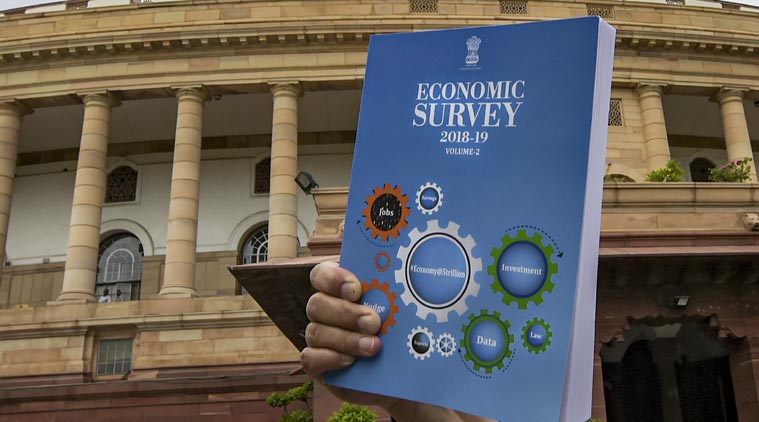 The Survey also suggested deregulating labour law restrictions to create more jobs, citing the recent changes in Rajasthan. (Image source: PTI)
The Survey also suggested deregulating labour law restrictions to create more jobs, citing the recent changes in Rajasthan. (Image source: PTI)
The country should focus on policies to unshackle micro, small and medium enterprises (MSMEs) to create more jobs and raise productivity, with a special focus on promoting young firms that have the potential to turn big rather than MSME firms which remain small, the Economic Survey for 2018-19, which was tabled in Parliament Thursday, said. The Survey also suggested deregulating labour law restrictions to create more jobs, citing the recent changes in Rajasthan.
To unshackle MSMEs and thereby to enable them to grow, all size-based incentives must have a sunset clause of less than ten years with necessary grand-fathering, the Survey said.

Explained: Economic Survey 2019 — new ideas to policy prescriptions
The Survey said that the perception that small firms are significant job creators is not a true representation as small firms destroy jobs as much as they create. The Survey said ‘dwarf’ firms (with less than 100 workers and more than 10 years old) account for more than 50 per cent of all organised firms in manufacturing by number, but their contribution to employment is only 14 per cent and to productivity is a mere 8 per cent. Whereas, large firms (more than 100 employees) account for 75 per cent employment and close to 90 per cent of productivity despite accounting for about 15 per cent by number.
“Perverse incentives” targeting “dwarf” companies must be replaced with prioritising start-ups and “infant” firms, it said. “Our policies – across the board – protect and foster dwarfs rather than infants…these policies create a “perverse” incentive for firms to remain small. If the firms grow beyond the thresholds that these policies employ, then they will be unable to obtain the said benefits. Therefore, rather than grow the firm beyond the said threshold, entrepreneurs find it optimal to start a new firm to continue availing these benefits,” it said.
It added that labour legislations which exempt firms with less than 100 employees to get permission from the government before retrenching their employees, incentivises a large majority of firms to prefer to be below the threshold of 100 employees.
Most Read 1Vijay: ‘There’s only one Superstar and there’s only one Thalapathy’ 2Aishwarya Rai cuts birthday cake at an event with daughter Aaradhya Bachchan, refuses to eat as she is observing Karva Chauth. Watch video 3Lokesh Kanagaraj on plans for LCU: ‘New characters will come in; Vijay Sethupathi’s Sandhanam will be replaced’ 4‘Priyanka Chopra didn’t ask for permission, my choice was Alia Bhatt’: Ma Anand Sheela on rival biopics 5Diwali 2023 Date: When is Diwali in 2023?
Citing the example of Rajasthan, the Survey said the average number of firms with 100 employees or more was similar for Rajasthan and the rest of the country, but after the law change in 2014-15, the number of firms with 100 employees or more increased at a significantly higher rate in Rajasthan than in the rest of the country. The Survey suggested using Aadhaar to promote age-based incentives to firms. “Misuse of the age based criterion can be easily avoided using Aadhaar. For instance, if a promoter starts a new firm, utilizes the benefits for ten years when the age-based policy is available and then closes the firm to start a new one to avail the age-based benefits through this new firm, then the Aadhaar of the promoter can alert authorities about this misuse,” it said.
The survey calls for focus on high employment elastic sectors such as chemicals and chemical products, textiles and leather & leather products to enhance direct credit flow to sectors that can create the most jobs in the economy and service sectors like tourism. “According to the extant policy, certain targets have been prescribed for banks for lending to the micro, small and medium (MSME) sector that exacerbates perverse incentives to firms to remain small,” the Survey said. According to priority sector lending (PSL) guidelines, 7.5 per cent of adjusted net bank credit or credit equivalent amount of off-balance sheet exposure, whichever is higher is applicable to micro enterprises. Under MSME’s PSL targets, it is necessary to prioritise ‘start-ups’ and ‘infants’ in high employment-elastic sectors, it said.
Also ReadUnion Budget 2023 income tax slabs: New tax regime is default, rebate inc…FM radio industry has flourished, 388 private stations in 2022 June quart…Budget 2023: Smoking to be costlier, custom duty on cigarettes increasedUnion Budget: Push for highways sector, NHAI allocation up
The focus also must be on service sectors such as tourism, which has high spillover effects on other sectors such as hotel & catering, transport, real estate, entertainment etc. Identifying and promoting tourist spots for development will help create jobs, it said. “It is possible to identify 10 tourism spots in each of the larger 20 states and 5 spots in the 9 smaller states and build road and air connectivity in these tourist attractions, which would boost economic activity along the entire route and would also reduce the migration of the rural labour force who form a major proportion of the total labour force,” it said.

